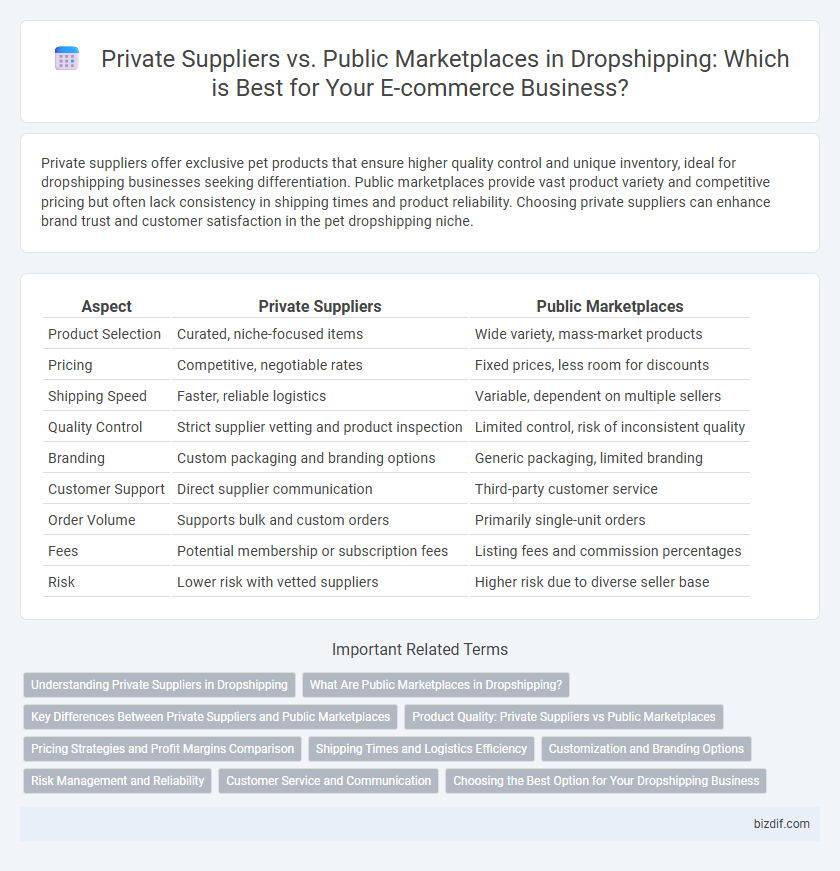Private suppliers offer exclusive pet products that ensure higher quality control and unique inventory, ideal for dropshipping businesses seeking differentiation. Public marketplaces provide vast product variety and competitive pricing but often lack consistency in shipping times and product reliability. Choosing private suppliers can enhance brand trust and customer satisfaction in the pet dropshipping niche.
Table of Comparison
| Aspect | Private Suppliers | Public Marketplaces |
|---|---|---|
| Product Selection | Curated, niche-focused items | Wide variety, mass-market products |
| Pricing | Competitive, negotiable rates | Fixed prices, less room for discounts |
| Shipping Speed | Faster, reliable logistics | Variable, dependent on multiple sellers |
| Quality Control | Strict supplier vetting and product inspection | Limited control, risk of inconsistent quality |
| Branding | Custom packaging and branding options | Generic packaging, limited branding |
| Customer Support | Direct supplier communication | Third-party customer service |
| Order Volume | Supports bulk and custom orders | Primarily single-unit orders |
| Fees | Potential membership or subscription fees | Listing fees and commission percentages |
| Risk | Lower risk with vetted suppliers | Higher risk due to diverse seller base |
Understanding Private Suppliers in Dropshipping
Private suppliers in dropshipping offer exclusive product access, higher profit margins, and tailored inventory control compared to public marketplaces like Amazon or eBay. These suppliers often provide better product quality, faster shipping times, and personalized customer service, enhancing brand reputation and customer satisfaction. Building strong relationships with private suppliers enables dropshippers to access unique products, avoid market saturation, and optimize supply chain efficiency.
What Are Public Marketplaces in Dropshipping?
Public marketplaces in dropshipping are online platforms where multiple sellers offer products directly to consumers without holding inventory themselves. These marketplaces, such as Amazon, eBay, and AliExpress, facilitate product listings, order processing, and customer support, enabling dropshippers to source a wide range of products from various suppliers. By leveraging public marketplaces, dropshippers can access diverse inventories and competitive pricing while relying on the platform's infrastructure for transaction security and delivery management.
Key Differences Between Private Suppliers and Public Marketplaces
Private suppliers offer exclusive products and personalized service, enabling greater control over inventory, pricing, and branding, which helps build unique value propositions in dropshipping. Public marketplaces provide vast product selection, high traffic, and streamlined order processing but involve higher competition and less control over product quality and customer experience. Understanding these key differences allows dropshippers to strategically choose between exclusivity and volume based on their business goals.
Product Quality: Private Suppliers vs Public Marketplaces
Private suppliers often provide higher product quality control through direct relationships and customized manufacturing processes, reducing the risk of counterfeit or defective items. Public marketplaces host numerous sellers with varying standards, increasing variability in product consistency and quality assurance. Choosing private suppliers enhances reliability and customer satisfaction by ensuring more stringent quality management throughout the supply chain.
Pricing Strategies and Profit Margins Comparison
Private suppliers often enable dropshippers to access wholesale pricing and exclusive product deals, resulting in higher profit margins compared to public marketplaces. Public marketplaces like Amazon or eBay impose higher fees and intense competition, which compresses pricing flexibility and reduces overall profitability. Leveraging private suppliers allows for strategic pricing adjustments tailored to niche audiences, enhancing margin optimization.
Shipping Times and Logistics Efficiency
Private suppliers in dropshipping often provide faster shipping times and more reliable logistics efficiency due to direct communication and streamlined inventory management. Public marketplaces typically experience longer shipping delays and varied logistics quality because of multiple sellers and less control over fulfillment. Choosing private suppliers can significantly enhance delivery speed and consistency, improving customer satisfaction and reducing shipping issues.
Customization and Branding Options
Private suppliers offer extensive customization and branding options, enabling dropshippers to create unique products and personalized packaging that strengthen brand identity. Public marketplaces typically provide limited customization, restricting sellers to generic product listings and branding that may dilute a store's uniqueness. Leveraging private suppliers enhances control over product quality and brand presentation, which is essential for building customer loyalty in competitive dropshipping markets.
Risk Management and Reliability
Private suppliers in dropshipping offer increased reliability due to direct communication, allowing better control over inventory and shipping times, which minimizes risks of stockouts and delays. Public marketplaces, while offering a wider product range, carry higher risks related to inconsistent product quality, delayed shipments, and limited accountability from multiple sellers. Effective risk management requires vetting private suppliers thoroughly and leveraging their consistent service levels to ensure customer satisfaction and reduce order fulfillment errors.
Customer Service and Communication
Private suppliers often provide tailored customer service with direct communication channels, enabling quicker resolution of issues and personalized support. Public marketplaces rely on platform-mediated interactions, which can delay response times and limit the depth of assistance due to standardized policies. Effective communication with private suppliers enhances trust and customer satisfaction, critical factors for sustainable dropshipping success.
Choosing the Best Option for Your Dropshipping Business
Selecting between private suppliers and public marketplaces directly impacts your dropshipping business's efficiency and scalability. Private suppliers offer exclusive products, better profit margins, and personalized support, which optimize inventory control and brand differentiation. Public marketplaces provide vast product variety and ease of access, but often involve higher competition and lower pricing power, influencing customer acquisition strategies and long-term growth.
Private Suppliers vs Public Marketplaces Infographic

 bizdif.com
bizdif.com